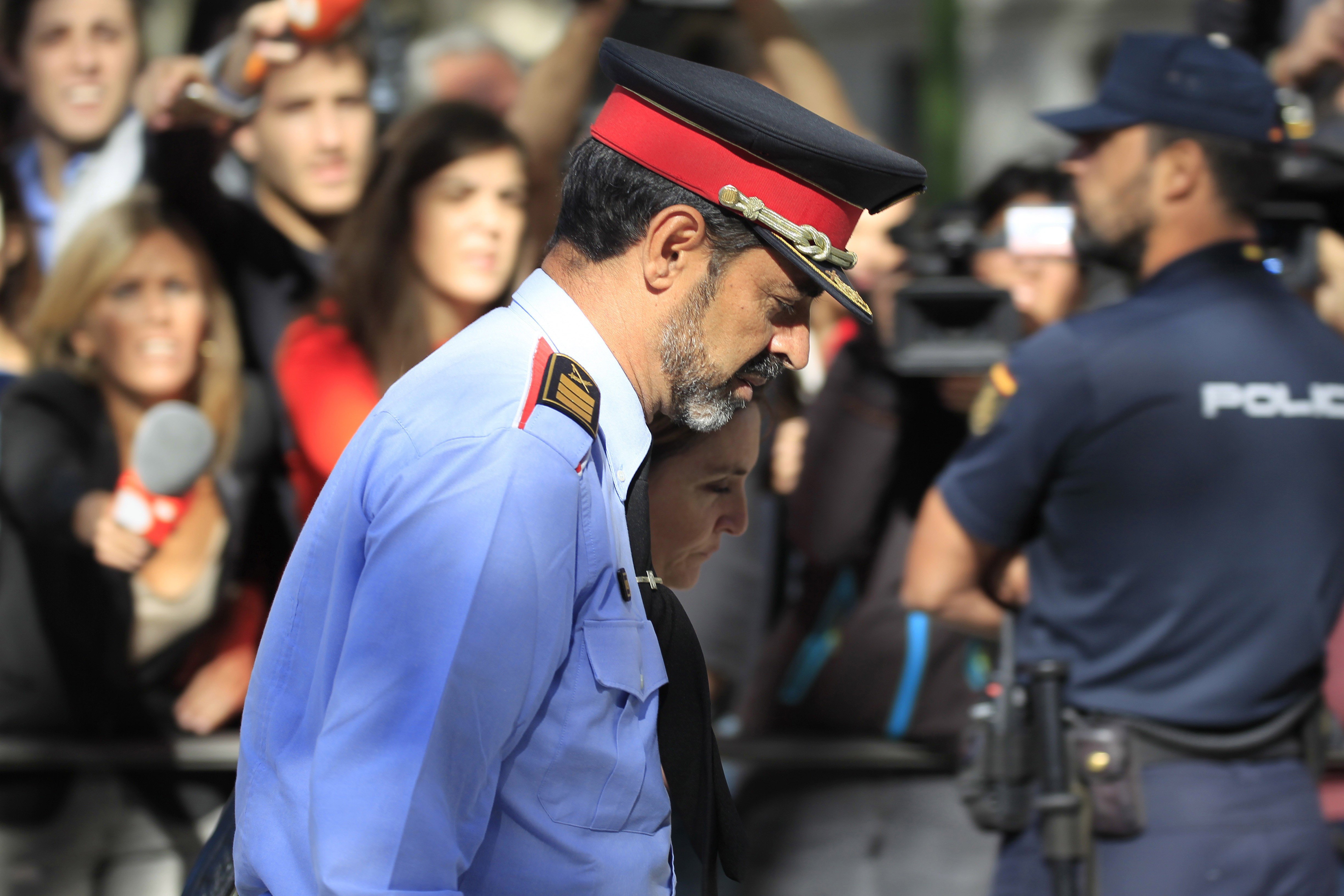Yet more charges over the Catalan independence process. A judge from Spain's National Audience court, Carmen Lamela, has indicted former chief of the Catalan police force, the Mossos d'Esquadra, Josep Lluís Trapero on two counts of sedition and one of criminal organisation. Also indicted are the force's former director Pere Soler and former general secretary from the Catalan interior department César Puig on one count of sedition and one of criminal organisation each, and superintendant Teresa Laplana, in charge of the officers deployed on 20th September, for sedition "for preventing by force the actions of the authorities and their agents in carrying out their tasks in defence of the constitutional order". The four are summonsed for 16th April at 10am. Their hearing will therefore coincide with those of the 25 charged by Pablo Llarena in the Supreme Court.
The judge justifies the two charges of sedition with article 544 of Spain's Penal Code in relation to the events that took place at the Catalan economy department on 20th and 21st September last year, as well as the 1st October referendum. The article in questions states that "they are guilty of sedition those who, without falling under the crime of rebellion, rise up publicly and tumultuously to prevent, by force or outside of legal means, the application of the laws or any authority, official corporation or civil servant in the legitimate exercise of their functions or the fulfillment of their agreements, or of administrative or legal resolutions". The "illegal aim" of these gatherings, which they seem to believe fall outside of public order, was to "break the state's territorial organisation".
Not only that. The judge also indicts Trapero, Solé and Puig for criminal organisation, defined by article 570 bis of the Penal Code as a "group formed by more than two people with a stable character or for an indefinite period, who in an arranged and coordinated way share out various tasks or functions with the aim of committing crimes".
Sedition
Lamela believes that the actions of the Mossos on 20th September and 1st October fit the crime of sedition, either directly or as necessary cooperators, "by not fulfilling their legal obligations to act, [failing to carry out] all action aimed at avoiding what in the end took place in front of the economy ministry: that the crowd, publicly, came to gather tumultuously at the economy ministry's building and, with the coercive and intimidatory force a hostile crowd offers to possible police action, with the aim of preventing or gravely hindering the enacting of the legal search warrant". "Far from taking action, they limited themselves to showing the impossibility of such action in view of the tumult of people gathered at the building, when it reality this was an open refusal to the repeated requests for help they received from the Civil Guard, with the aim of protecting the legal commission entrusted with carrying out the search by legal warrant".
In terms of the day of the referendum, the actions by those charged went beyond not fulfilling the legal orders, says the judge, encouraging the chances that "their plans were known in advance by the occupants of the polling stations, in that way enabling them to be able to prepare the scenarios which would lead the Mossos to not act, obstructing the police agents, really prepared to obey that legal order, spying on and monitoring their actions".
The judge notes that sedition requires a revolt, uprising or insurrection against the normal working of institutions, but doesn't require the use of force, acting outside established legal means being sufficient. Nor does it require those involved to achieve their objectives, the act of rising up is enough for the crime to have been committed. A contributing factor, according to the judge, is that the suspects' ultimate intention was to "break the state's territorial organisation", their actions being aimed at declaring the independence of part of the national territory, violating the constitution. As such, Lamela writes, "they also have to be considered as crimes against the form of government".
Criminal organisation headed by Puigdemont
"In the framework of a premeditated and perfectly coordinated strategy", the judge describes the distribution of roles between government, parliamentary and civil authorities to bring about secession. Lamela focuses on the "illegal" use of the Mossos as part of this plan, especially on the 20th September and 1st October. The police, according to the judge, "stayed on the fringes of any actions taken by the [Spanish National] Police or the Civil Guard, with behaviour aimed at obstructing any action which would block the strategic plan towards independence", following guidelines previously announced publicly by Soler, Monte and interior minister Joaquim Forn.
With respect to the 1st October, the judge describes a "premeditated plan" for the Mossos to avoid taking action, and that "disguised under the principles of proportional, congruent and opportune police action, was total inactivity".
Lamela says that, after analysing the facts, she concludes that Trapero, Soler and Puig formed part of a criminal organisation obeying well-defined guidelines of subordination and teamwork. The judge lists the requirements for the crime (namely hierarchy, continuity in time, coordination and cooperation, sharing out of tasks and planning) and concludes that the three were part of a hierarchical organisation "under common leadership, at the peak of which was found the president of Catalonia". This organisation, she says, was stabled over more than two years, included assignment of tasks and a perfectly synchronised strategical convergence in agreement with the criminal organisation's plan, which was what eventually allowed the holding of the referendum on 1st October last year, and the later declaration of independence by the Parliament of Catalonia.

